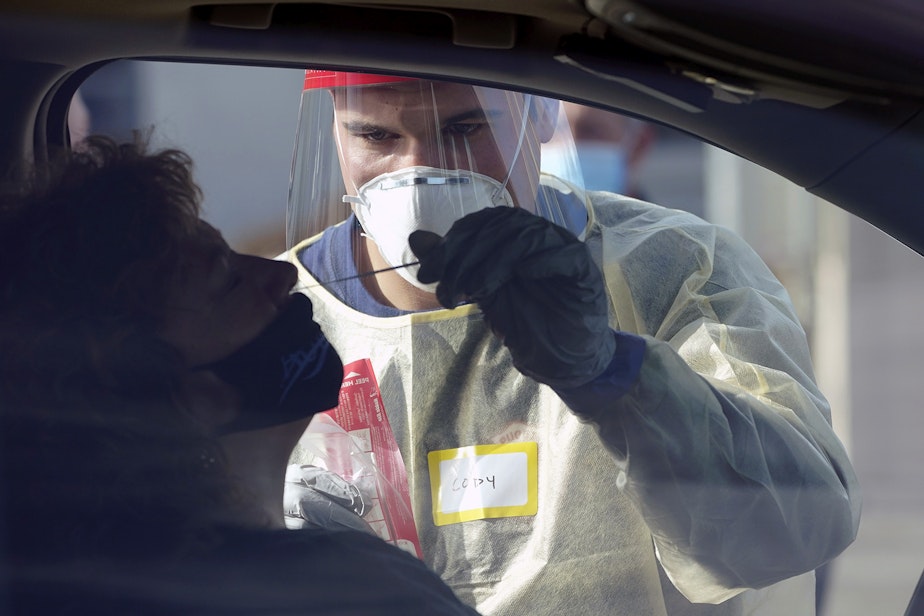WA Covid-19 cases reach record highs as holidays approach

Washington state health officials are pleading with people to continue social distancing as the holiday season approaches and the temptation to congregate indoors increases.
The state last week saw an all-time high number of new Covid-19 cases, with nearly 1,500 people testing positive for the disease. While officials did not say whether another stay-home order is on the horizon, they didn't say one was off the table, either.
As of Tuesday, Washington has seen more than 120,000 known Covid-19 cases and almost 2,500 deaths. Nationally, Covid hospitalizations have hit a record high and the death toll stands at over 239,000, according to John Hopkins University.
Since this past summer, state and local health officials have warned that coronavirus infection rates could skyrocket as people begin moving their social activities indoors to avoid the cold.
Now, those fears are quickly becoming a reality.
"Unfortunately, this accelerated growth in case counts is widespread, occurring in both western and eastern Washington," said state health officer Dr. Kathy Lofy during a Tuesday press briefing. "This is not due to increased testing — this is a real increase in disease."
Lofy added that cases are on the rise among all age groups, indicating that community transmission — or transmission in which infections can't be linked back to a known case — is up again.
Sponsored
"Ideally, we should probably all stop socializing for the next several weeks to try to slow down the disease that's rapidly spreading through our state," Lofy said.
"But if you need to socialize, please limit your social contacts to no more than five people outside of your household per week, and keep your social interactions as short as possible."
Health officials also outlined concerns about hospitals becoming overwhelmed yet again, as another coronavirus wave takes hold.
"When we see high numbers of Covid-19 cases and transmissions happen in the community, that threatens healthcare workers," said Dr. John Lynch with Harborview Medical Center in Seattle. "We need those folks to be able to come to work and to continue providing their care."
Lynch added that hospitals are also preparing for an increased demand for personal protective gear, in addition to a potential influx of patients.
"People are still getting very very sick," Lynch said. "They're ending up in the ICU, and they're dying. And these folks are not just the older folks ... they span the entire spectrum of age groups."
Sponsored
State officials haven't said definitively whether another statewide stay-home order is on the horizon.
But "it wouldn't be necessary if people were able to do the other things that they can do immediately right now on their own," said David Postman, Governor Jay Inslee's chief of staff, on Tuesday.
"It doesn't mean we won't come with some sort of restriction as we saw in the spring," he said.
Postman added that any such decision would be made with the input of local health jurisdictions and other agencies.
Officials are urging Washingtonians to be especially cautious of pandemic fatigue as the holiday season approaches.
"When our brains get really tired, on a neurological level, it makes it really difficult to make careful, rational decisions about safety and health — we're more likely to be impulsive," said Kira Mauseth, co-lead of the state health department's behavioral health strike team.
Mauseth added that people should be aware that increased substance use during the holiday season could also impact decision-making around Covid safety.
"All of us have a strong desire — and even a need on an emotional level — to have a fun holiday season, to be joyful, celebratory, and as close to normal as possible," she said. "The temptation there is to downplay the risk."
Sponsored
Lacy Fehrenbach, the deputy secretary for the state's Covid response, urged people to limit in-person Thanksgiving celebrations to attendees who share a household, and to only include extended family virtually. She pointed to a surge in cases seen in Canada, following the Canadian Thanksgiving holiday on October 11.
"It's important to remember that we can get Covid from people we know, love, and trust, who may not yet know they have it or be asymptomatic," Fehrenbach said.
But for people who insist on having small gatherings, state officials are asking that those celebrations be limited to an outdoor setting with no more than five people from outside of a given household.
"You should seriously consider a full quarantine for the two weeks prior, which starts very soon," Fehrenbach said. "This means only leaving your home for essential things like groceries or prescriptions, or a brief walk around the neighborhood."
Ideas for socially distanced alternatives to traditional holiday celebrations can be found here.




